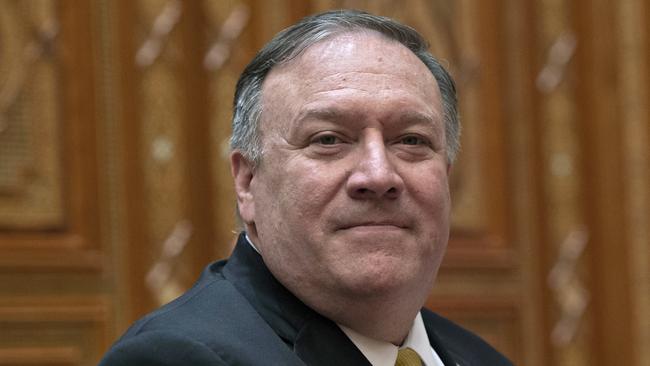Mike Pompeo optimistic on trade talks with China
US Secretary of State Mike Pompeo says a superpower conflict with China can be avoided in next week’s trade talks.

US Secretary of State Mike Pompeo says a superpower conflict with China can be avoided in next week’s trade talks, despite reports yesterday that meetings between lower-level officials set for this week had been cancelled.
Speaking by video to the annual Davos summit of big business in Switzerland, he confirmed talks set down for next week would go ahead, saying he expected a good outcome.
Despite his optimism, Mr Pompeo criticised China, saying it was belligerent towards its neighbours and “embracing totalitarianism”. He said the trade differences between the two sides could be resolved if Beijing were to accept the principles of fair and open trade and protection of intellectual property.
“I am optimistic that we will receive them (the Chinese negotiators) well and we will have a good outcome from those conversations,” Mr Pompeo said.
“There are those who say that a superpower conflict between our countries is inevitable,” he said. “We don’t see it that way.”
The US and China want to reach a trade deal by March 1, amid threats from President Donald Trump to impose new tariffs of 25 per cent on another $US200 billion ($280bn) worth of Chinese exports to the US if both sides can’t reach an agreement.
The Chinese negotiations will be led by Vice-Premier Liu He, one of the most senior members of the Chinese government, who is set to meet US Trade Representative Robert Lighthizer in Washington.
Mr Pompeo’s comments come as the White House denied reports in several media outlets in the US yesterday that a visit to Washington this week by lower-level Chinese officials in preparation for next week’s talks had been cancelled, raising fears of a major setback in the negotiations.
The reports sent the US stockmarket down on concerns that the critical negotiations may have stalled.
It was widely reported earlier in the week that Chinese vice-ministers Wang Shouwen and Liao Min would travel to Washington this week for talks, but the director-general of the US National Economic Council, Lawrence Kudlow, said the stories were not true and there had never been meetings planned between US and China officials in Washington this week.
The disputed news reports are a reflection of the mixed messages coming out of the Trump administration on the trade talks.
Mr Kudlow said the US would continue to press the Chinese on the subject of intellectual property and state intervention in markets, among other matters.
He also said American officials were insisting that any agreement have teeth to ensure Beijing’s compliance.
“Enforcement is absolutely crucial to the success of these talks,” Mr Kudlow said.
He said he did not want to predict whether the US and China could reach a deal before the March 1 deadline. “I wouldn’t dare predict and want to make sure people understand how important that is to put it on the table,’’ he said.
Mr Pompeo’s comments were in line with comments by Mr Trump last weekend, when he said the talks were going very well.
The President has denied he is considering lifting existing tariffs on Chinese exports, which were imposed last year.
Uncertainties generated by the US-China trade war have caused concerns in world financial markets and contributed to a slowdown in global economic growth. On Monday, China reported its weakest annual growth in nearly three decades, hurt by rising US tariffs, and the International Monetary Fund cited the trade war in downgrading its global 2019 outlook for the second time in three months.
With Reuters



